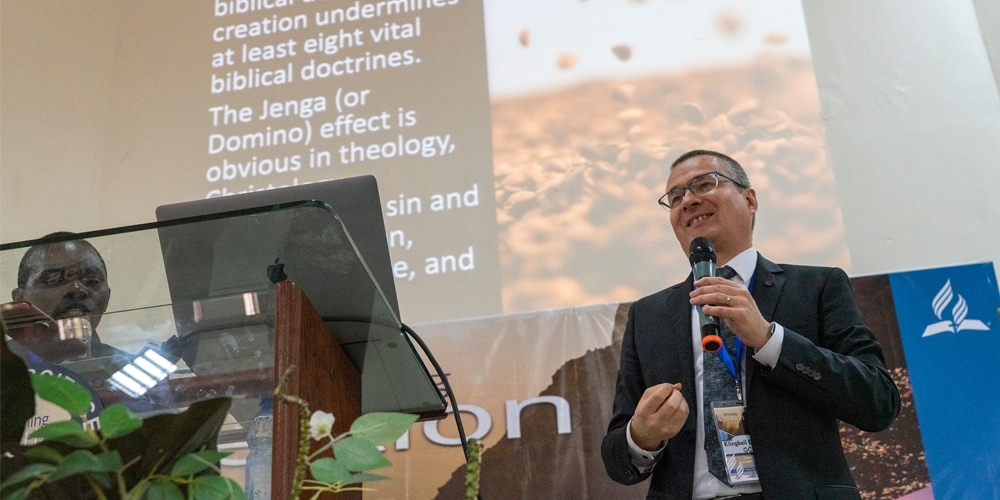
Eight hundred teachers and administrators spent nine days at Gahogo Adventist Academy in Muhanga, Rwanda, discussing creation in a faith and science conference organized by the East-Central Africa Division (ECD) and international partners, December 11-19, 2018.
More than 60 presentations covered a wide range of topics such as creation in both Old and New Testaments. Also discussed were Scripture-based hermeneutics and the understanding of a biblical worldview in regard to questions of geology, dealing with the fossil record, molecular biology, intelligent design, carbon 14 dating, and more.
Delegates from the ECD church region came from the Democratic Republic of Congo, Eritrea, Ethiopia, Kenya, the host country Rwanda, South Sudan, Tanzania, and Uganda. They also came from other African countries, including Côte d’Ivoire, Nigeria, and Zimbabwe. Many of the participants spent several days riding buses through neighboring countries to reach the conference location.
“The majority of Adventist teachers in ECD are converts to the Adventist faith,” noted Andrew Mutero, ECD Education Department director and one of the main organizers of the event. “They did not have an opportunity to attend Adventist schools. This conference gave them an opportunity to reflect and comprehend an Adventist understanding of biblical creation.”
Presenters included researchers from the world church’s Geoscience Research Institute (GRI), as well as scientists from other Adventist universities, including Southwestern Adventist University (SWAU) and Loma Linda University (LLU).
In his presentations, Frank Hasel, an associate director of the Biblical Research Institute of the General Conference, focused on the principles of biblical hermeneutics and crucial connections between biblical interpretation and the biblical concept of creation. Gerald Klingbeil, an associate editor of Adventist Review/Adventist World magazines and an Andrews University research professor of Old Testament and ancient Near Eastern studies, spoke about the biblical record of creation, the omnipresence of creation motif in the biblical text, and the importance of the doctrine within the larger context of Adventist theology. Ed Zinke, one of the organizers of the event, highlighted the importance of biblical authority and worldview and their impact on the faith and science debate.
Adventist scientists engaged conference participants with issues and questions generated by the standard evolution paradigm. SWAU professor Art Chadwick discussed the geology of the Grand Canyon and also spoke on paleocurrents. GRI senior scientist Raúl Esperante presented evidence from a long-term research project in Peru unearthing fossil whales and discussed geological phenomena in the framework of a worldwide flood. GRI senior scientist Tim Standish spoke about intelligent design and evidence for a recent creation. LLU biology professor Suzanne Phillips offered an introduction to recent biological insights undermining the standard evolution paradigm.
Participants could also sign up for 13 workshop tracks that offered more specialized interaction between teachers and presenters focusing on a number of relevant topics. For example, LLU Excellence in STEM Experiential Education (EXSEED) director Doug Havens spoke about augmented and virtual reality and science and offered teachers practical guidance on how to produce simple headsets working with smartphones and how to work with free or low-cost software needed to create engaging science lessons.
While recognizing the logistical challenges of housing and feeding 800 participants in a timely and organized way, participants said they left satisfied with the event. Peter Kereri, a teacher from Kenya, said he appreciated the content but wished for more interaction. “[I would have liked] for more question and answer periods and further engagement,” he said.
Chris Muzira from Uganda said he enjoyed the resourceful presenters, even though he thinks that a future conference should limit the number of conference days to a week. Sabato Mafwele from Tanzania agreed. “I liked the smaller workshops,” he said, “but I hope for a less packed program for future events.”
A participant from Eritrea praised the timeliness of the event, at a time when evolution, he said, is being pushed by governments in the region as the overall science framework.
Millicent Ojwan’g contributed to this report.